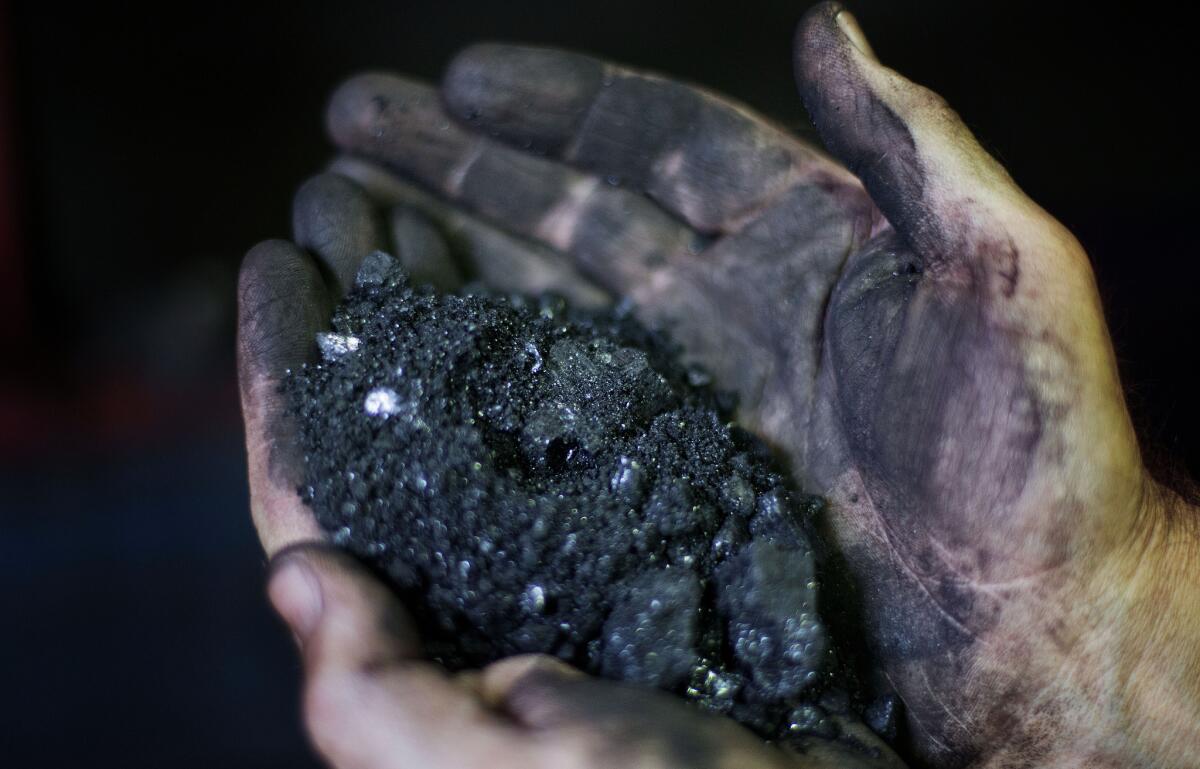Editorial: How do we ditch dirty coal power without sending miners to the unemployment line?

A miner holds coal at a processing plant in Welch, W.Va. in 2015. For the long-suffering communities that depend on coal, a recent Supreme Court ruling temporarily blocking greenhouse gas reductions was seen as a rare victory.
The nation — in fact, the world — needs to wean itself from fossil fuels if it is to have any hope of managing climate change. Burning coal is particularly bad for the environment, pumping far higher quantities of global-warming compounds into the atmosphere than natural gas, oil or other carbon-based products do. So it’s heartening that the U.S. has been using less coal to generate electricity in recent years. An unrelated drop in coal-fired steel production in China has also reduced the amount of coal U.S. firms have scratched out of the ground and shipped overseas. Yet more needs to be done to speed up the shift to cleaner, more sustainable energy sources.
Though transitioning away from fossil fuels is absolutely necessary, it’s also vitally important to recognize the human and economic cost that such a change entails. That includes a significant number of jobs lost in northern Appalachia, Indiana and Illinois, and Wyoming, where the vast majority of the nation’s existing coal mines are found. Closing coal mines means cutting good-paying jobs in places where replacement work for similar pay is hard to come by. Though that shouldn’t slow the move away from fossil fuel, our energy policies need to be mindful of the disparate effect on coal-dependent communities, many of which are in rural and economically weak areas of the country.
A bill in Congress could mitigate some of that economic impact. The proposed RECLAIM (Revitalizing the Economy of Coal communities by Leveraging local Activities and Investing More) Act would tweak an existing program aimed at securing old abandoned mines — for the sake of public safety as well as environmental protection — to make $1 billion available over five years for economic development primarily in old coal mining areas of Appalachia. The measure, introduced by Rep. Hal Rogers (R-Ky.) and backed by a bipartisan group of Appalachian lawmakers as well as the Sierra Club, dovetails with the Obama administration’s Power-Plus program, a broader effort to encourage economic diversification, job creation and other support for communities now reliant on coal mines and coal-fired power plants, as well as carbon-capture and sequestration projects.
------------
For the Record
March 4, 11:45 a.m.: An earlier version of this article incorrectly stated that Rep. Hal Rogers’ congressional district was in West Virginia. It is in Kentucky.
------------
The RECLAIM Act would take a portion of the money that now goes into the Abandoned Mine Reclamation Fund, which is dedicated to cleaning up mines closed before 1977, and redirect it to economic development projects in old coal communities suffering from their mines’ environmental effects and the decline in coal jobs. The Abandoned Mine Reclamation Fund is financed through a fee on mined coal, which has raised $10.5 billion since 1977.
Rogers’ bill would make available $200 million a year over five years for reclamation projects that dovetail with economic development proposals on or adjacent to the abandoned mine sites. In essence, the backers say, the RECLAIM Act would take fee revenue that the government already has in hand and make it available sooner than it otherwise would be.
The economic development projects would be proposed by local officials and vetted at the state level, then reviewed by the Interior Department. Advocates envision everything from new retail centers to forestation projects designed to support logging in the future.
There’s a broader concern over whether the shrinking fees collected from coal will be enough to cover all the obligations the fund already has, including about $9 billion worth of “high priority” projects. But supporters say the RECLAIM Act wouldn’t affect that bottom line, since the money allocated under it would still go to reclamation projects.
Notably, the reclamation fund isn’t responsible for the restoration work that will eventually be needed at currently operating mines. Those businesses are supposed to post bonds to ensure that the land will be reclaimed once the mining is finished, whether the coal firm survives or not. Several states have let companies off that hook, however, by allowing them to put up little more than a pledge that they’ll fund the work. As the industry collapses, that looms as a significant potential problem for environmental remediation.
Still, it makes sense to twin economic development proposals with reclamation projects. Although Rogers’ proposal wouldn’t compensate for all the job losses already caused by the shrinking coal industry, it marks a positive step in both recognizing and addressing the economic fallout of leaving coal behind. Congress should pass this bill and the president should sign it. But the government should also ensure that the initial goal of the reclamation program — to mitigate dangerous abandoned coal mines — is fulfilled.
Follow the Opinion section on Twitter @latimesopinion and Facebook
More to Read
A cure for the common opinion
Get thought-provoking perspectives with our weekly newsletter.
You may occasionally receive promotional content from the Los Angeles Times.






